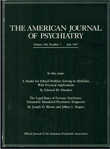Negative Attributional Style in Seasonal and Nonseasonal Depression
Abstract
OBJECTIVE: There is a substantial relationship between dysfunctional cognitions and the clinical course of major depression. This study examined whether this association extends to patients with seasonal affective disorder. METHOD: A revised version of the Attributional Style Questionnaire was used to assess negative attributional style and predict response to treatment in a group of depressed outpatients, 26 with seasonal depression and 30 with nonseasonal, unipolar major depression. RESULTS: Pretreatment scores on negative attributional style did not differ between the patients with seasonal affective disorder and those with nonseasonal depression. Negative attributional style predicted poor response to pharmocotherapy in the nonseasonal depression group but did not predict response to light therapy in the group with seasonal affective disorder. CONCLUSIONS: Dysfunctional cognitions may play a lesser role in seasonal affective disorder than in nonseasonal depression.



